TUI Group in the UK Air Travel Industry: A Strategic Case Study
VerifiedAdded on 2023/03/21
|7
|1609
|90
Case Study
AI Summary
This case study provides an overview of the UK air travel industry, focusing on TUI Group, a major international travel and tourism company. It examines TUI's marketing strategies, including its hybrid approach that balances cost control and product differentiation. The analysis includes a look at TUI's main competitors such as Thomas Cook and discusses the importance of supply chain management in enhancing customer service and reducing operational costs. Furthermore, the study explores TUI's marketing approaches, pricing strategies like penetration pricing, and efforts to build brand value through advertising and promotion. The case study also touches on human resource management practices within TUI, emphasizing employee relations and training programs, ultimately concluding that the airline travel industry significantly contributes to the economy and that TUI's competitive edge is sustained through strategies informed by Porter's Five Forces model.
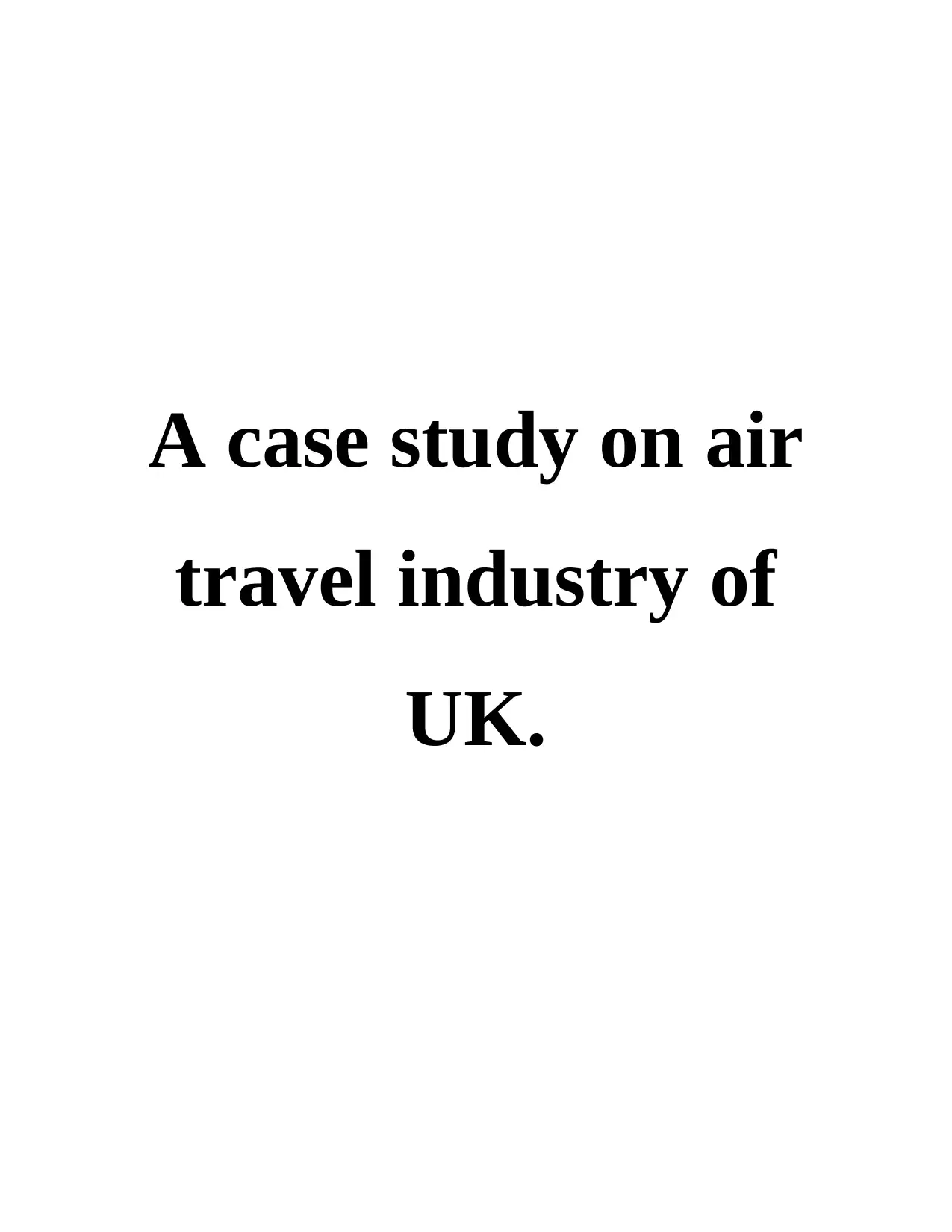
A case study on air
travel industry of
UK.
travel industry of
UK.
Paraphrase This Document
Need a fresh take? Get an instant paraphrase of this document with our AI Paraphraser
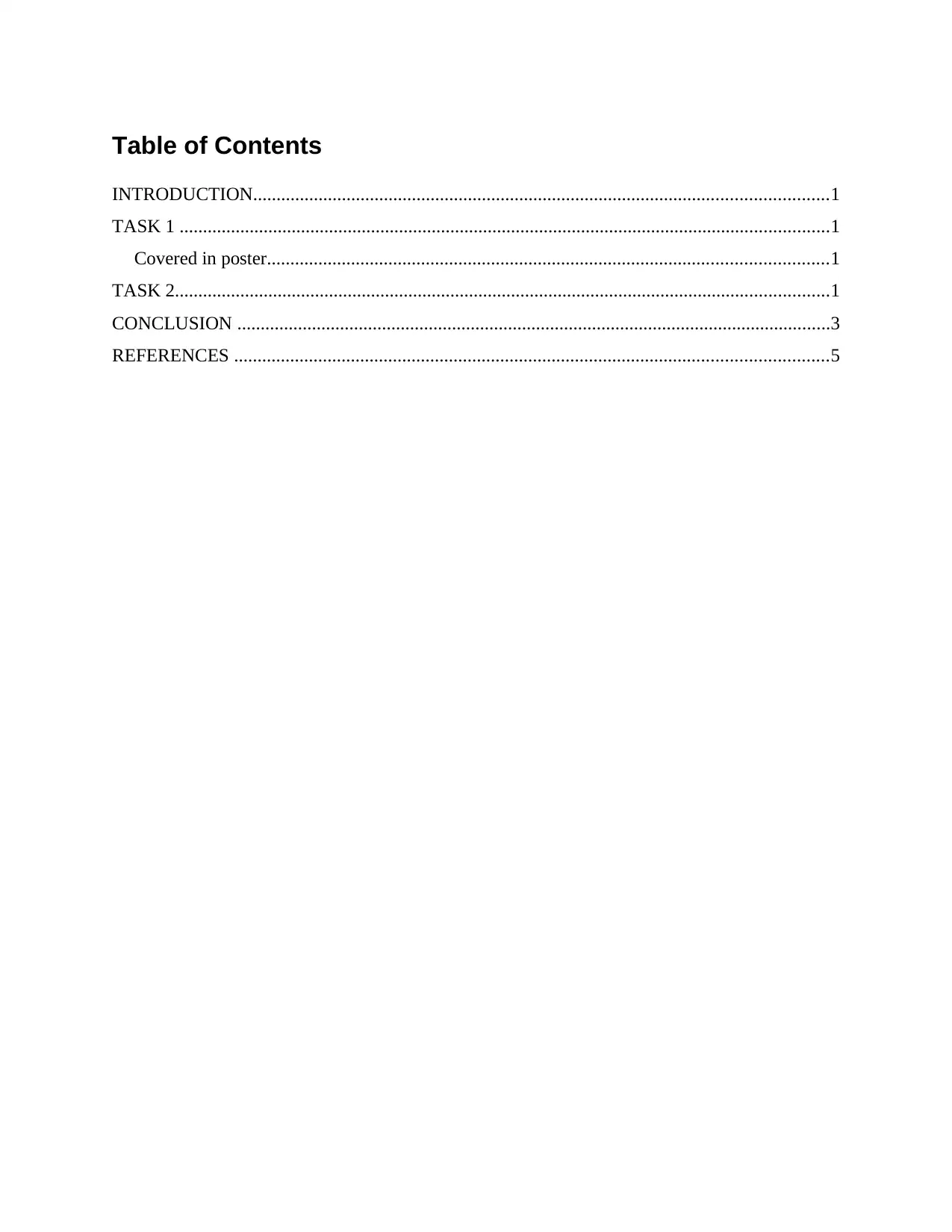
Table of Contents
INTRODUCTION...........................................................................................................................1
TASK 1 ...........................................................................................................................................1
Covered in poster........................................................................................................................1
TASK 2............................................................................................................................................1
CONCLUSION ...............................................................................................................................3
REFERENCES ...............................................................................................................................5
INTRODUCTION...........................................................................................................................1
TASK 1 ...........................................................................................................................................1
Covered in poster........................................................................................................................1
TASK 2............................................................................................................................................1
CONCLUSION ...............................................................................................................................3
REFERENCES ...............................................................................................................................5
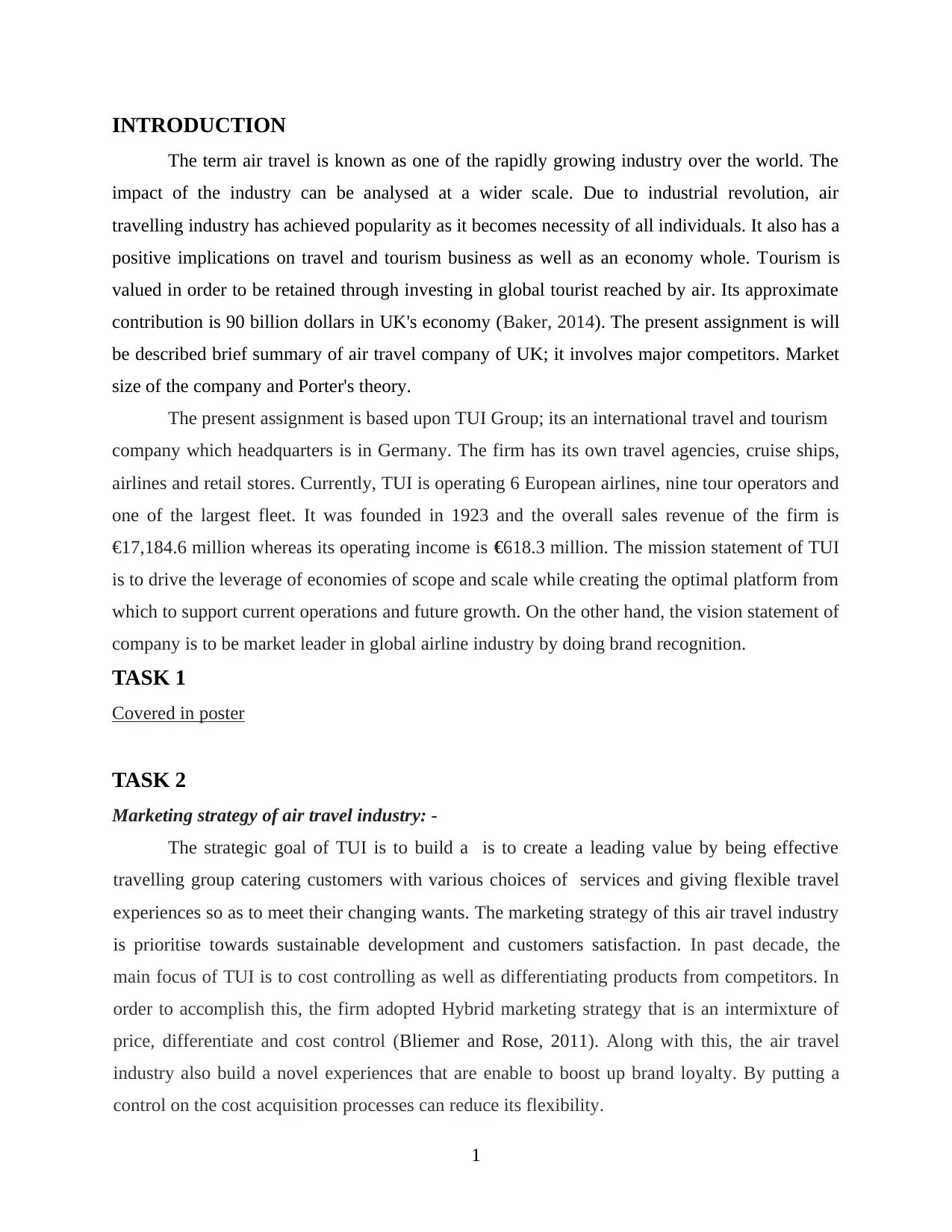
INTRODUCTION
The term air travel is known as one of the rapidly growing industry over the world. The
impact of the industry can be analysed at a wider scale. Due to industrial revolution, air
travelling industry has achieved popularity as it becomes necessity of all individuals. It also has a
positive implications on travel and tourism business as well as an economy whole. Tourism is
valued in order to be retained through investing in global tourist reached by air. Its approximate
contribution is 90 billion dollars in UK's economy (Baker, 2014). The present assignment is will
be described brief summary of air travel company of UK; it involves major competitors. Market
size of the company and Porter's theory.
The present assignment is based upon TUI Group; its an international travel and tourism
company which headquarters is in Germany. The firm has its own travel agencies, cruise ships,
airlines and retail stores. Currently, TUI is operating 6 European airlines, nine tour operators and
one of the largest fleet. It was founded in 1923 and the overall sales revenue of the firm is
€17,184.6 million whereas its operating income is €618.3 million. The mission statement of TUI
is to drive the leverage of economies of scope and scale while creating the optimal platform from
which to support current operations and future growth. On the other hand, the vision statement of
company is to be market leader in global airline industry by doing brand recognition.
TASK 1
Covered in poster
TASK 2
Marketing strategy of air travel industry: -
The strategic goal of TUI is to build a is to create a leading value by being effective
travelling group catering customers with various choices of services and giving flexible travel
experiences so as to meet their changing wants. The marketing strategy of this air travel industry
is prioritise towards sustainable development and customers satisfaction. In past decade, the
main focus of TUI is to cost controlling as well as differentiating products from competitors. In
order to accomplish this, the firm adopted Hybrid marketing strategy that is an intermixture of
price, differentiate and cost control (Bliemer and Rose, 2011). Along with this, the air travel
industry also build a novel experiences that are enable to boost up brand loyalty. By putting a
control on the cost acquisition processes can reduce its flexibility.
1
The term air travel is known as one of the rapidly growing industry over the world. The
impact of the industry can be analysed at a wider scale. Due to industrial revolution, air
travelling industry has achieved popularity as it becomes necessity of all individuals. It also has a
positive implications on travel and tourism business as well as an economy whole. Tourism is
valued in order to be retained through investing in global tourist reached by air. Its approximate
contribution is 90 billion dollars in UK's economy (Baker, 2014). The present assignment is will
be described brief summary of air travel company of UK; it involves major competitors. Market
size of the company and Porter's theory.
The present assignment is based upon TUI Group; its an international travel and tourism
company which headquarters is in Germany. The firm has its own travel agencies, cruise ships,
airlines and retail stores. Currently, TUI is operating 6 European airlines, nine tour operators and
one of the largest fleet. It was founded in 1923 and the overall sales revenue of the firm is
€17,184.6 million whereas its operating income is €618.3 million. The mission statement of TUI
is to drive the leverage of economies of scope and scale while creating the optimal platform from
which to support current operations and future growth. On the other hand, the vision statement of
company is to be market leader in global airline industry by doing brand recognition.
TASK 1
Covered in poster
TASK 2
Marketing strategy of air travel industry: -
The strategic goal of TUI is to build a is to create a leading value by being effective
travelling group catering customers with various choices of services and giving flexible travel
experiences so as to meet their changing wants. The marketing strategy of this air travel industry
is prioritise towards sustainable development and customers satisfaction. In past decade, the
main focus of TUI is to cost controlling as well as differentiating products from competitors. In
order to accomplish this, the firm adopted Hybrid marketing strategy that is an intermixture of
price, differentiate and cost control (Bliemer and Rose, 2011). Along with this, the air travel
industry also build a novel experiences that are enable to boost up brand loyalty. By putting a
control on the cost acquisition processes can reduce its flexibility.
1
⊘ This is a preview!⊘
Do you want full access?
Subscribe today to unlock all pages.

Trusted by 1+ million students worldwide
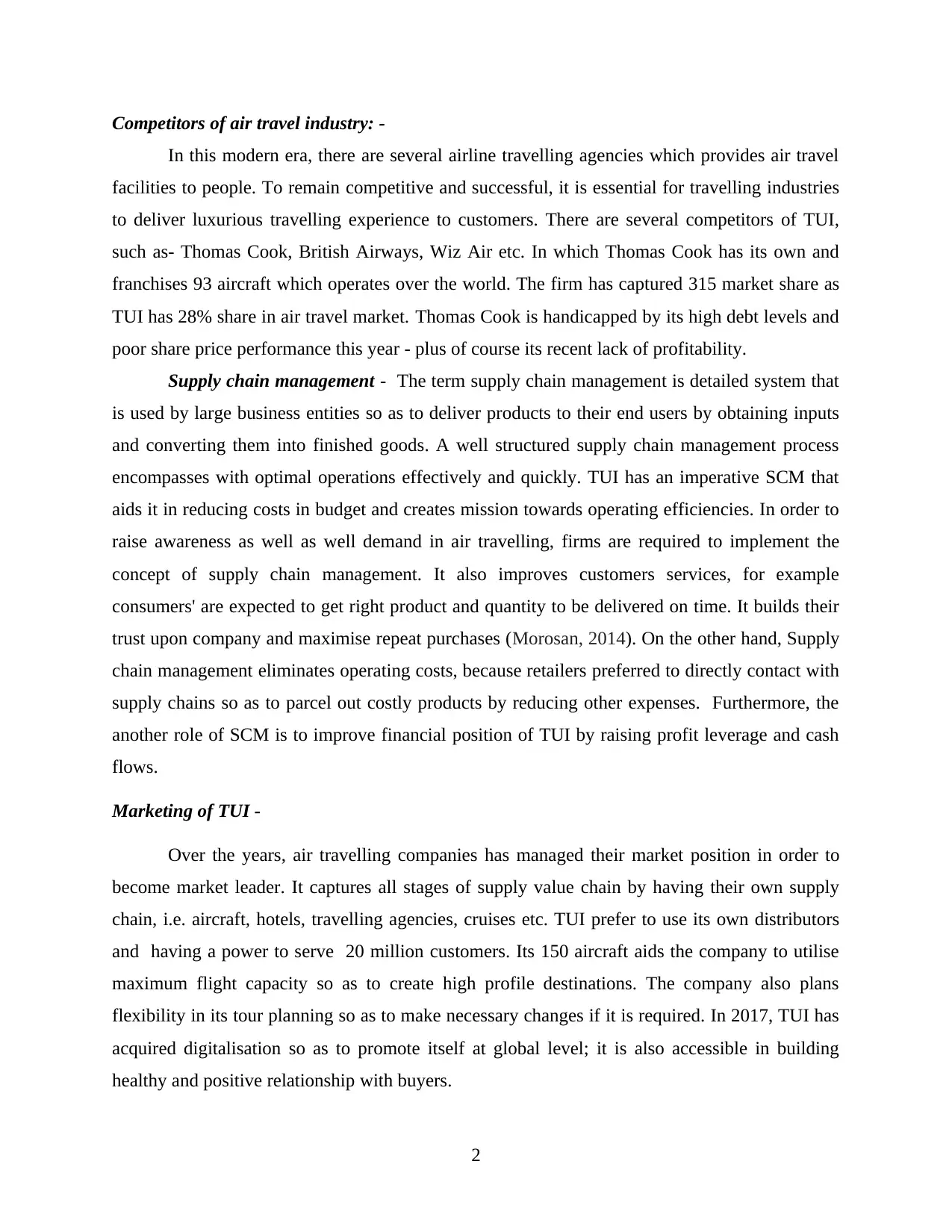
Competitors of air travel industry: -
In this modern era, there are several airline travelling agencies which provides air travel
facilities to people. To remain competitive and successful, it is essential for travelling industries
to deliver luxurious travelling experience to customers. There are several competitors of TUI,
such as- Thomas Cook, British Airways, Wiz Air etc. In which Thomas Cook has its own and
franchises 93 aircraft which operates over the world. The firm has captured 315 market share as
TUI has 28% share in air travel market. Thomas Cook is handicapped by its high debt levels and
poor share price performance this year - plus of course its recent lack of profitability.
Supply chain management - The term supply chain management is detailed system that
is used by large business entities so as to deliver products to their end users by obtaining inputs
and converting them into finished goods. A well structured supply chain management process
encompasses with optimal operations effectively and quickly. TUI has an imperative SCM that
aids it in reducing costs in budget and creates mission towards operating efficiencies. In order to
raise awareness as well as well demand in air travelling, firms are required to implement the
concept of supply chain management. It also improves customers services, for example
consumers' are expected to get right product and quantity to be delivered on time. It builds their
trust upon company and maximise repeat purchases (Morosan, 2014). On the other hand, Supply
chain management eliminates operating costs, because retailers preferred to directly contact with
supply chains so as to parcel out costly products by reducing other expenses. Furthermore, the
another role of SCM is to improve financial position of TUI by raising profit leverage and cash
flows.
Marketing of TUI -
Over the years, air travelling companies has managed their market position in order to
become market leader. It captures all stages of supply value chain by having their own supply
chain, i.e. aircraft, hotels, travelling agencies, cruises etc. TUI prefer to use its own distributors
and having a power to serve 20 million customers. Its 150 aircraft aids the company to utilise
maximum flight capacity so as to create high profile destinations. The company also plans
flexibility in its tour planning so as to make necessary changes if it is required. In 2017, TUI has
acquired digitalisation so as to promote itself at global level; it is also accessible in building
healthy and positive relationship with buyers.
2
In this modern era, there are several airline travelling agencies which provides air travel
facilities to people. To remain competitive and successful, it is essential for travelling industries
to deliver luxurious travelling experience to customers. There are several competitors of TUI,
such as- Thomas Cook, British Airways, Wiz Air etc. In which Thomas Cook has its own and
franchises 93 aircraft which operates over the world. The firm has captured 315 market share as
TUI has 28% share in air travel market. Thomas Cook is handicapped by its high debt levels and
poor share price performance this year - plus of course its recent lack of profitability.
Supply chain management - The term supply chain management is detailed system that
is used by large business entities so as to deliver products to their end users by obtaining inputs
and converting them into finished goods. A well structured supply chain management process
encompasses with optimal operations effectively and quickly. TUI has an imperative SCM that
aids it in reducing costs in budget and creates mission towards operating efficiencies. In order to
raise awareness as well as well demand in air travelling, firms are required to implement the
concept of supply chain management. It also improves customers services, for example
consumers' are expected to get right product and quantity to be delivered on time. It builds their
trust upon company and maximise repeat purchases (Morosan, 2014). On the other hand, Supply
chain management eliminates operating costs, because retailers preferred to directly contact with
supply chains so as to parcel out costly products by reducing other expenses. Furthermore, the
another role of SCM is to improve financial position of TUI by raising profit leverage and cash
flows.
Marketing of TUI -
Over the years, air travelling companies has managed their market position in order to
become market leader. It captures all stages of supply value chain by having their own supply
chain, i.e. aircraft, hotels, travelling agencies, cruises etc. TUI prefer to use its own distributors
and having a power to serve 20 million customers. Its 150 aircraft aids the company to utilise
maximum flight capacity so as to create high profile destinations. The company also plans
flexibility in its tour planning so as to make necessary changes if it is required. In 2017, TUI has
acquired digitalisation so as to promote itself at global level; it is also accessible in building
healthy and positive relationship with buyers.
2
Paraphrase This Document
Need a fresh take? Get an instant paraphrase of this document with our AI Paraphraser
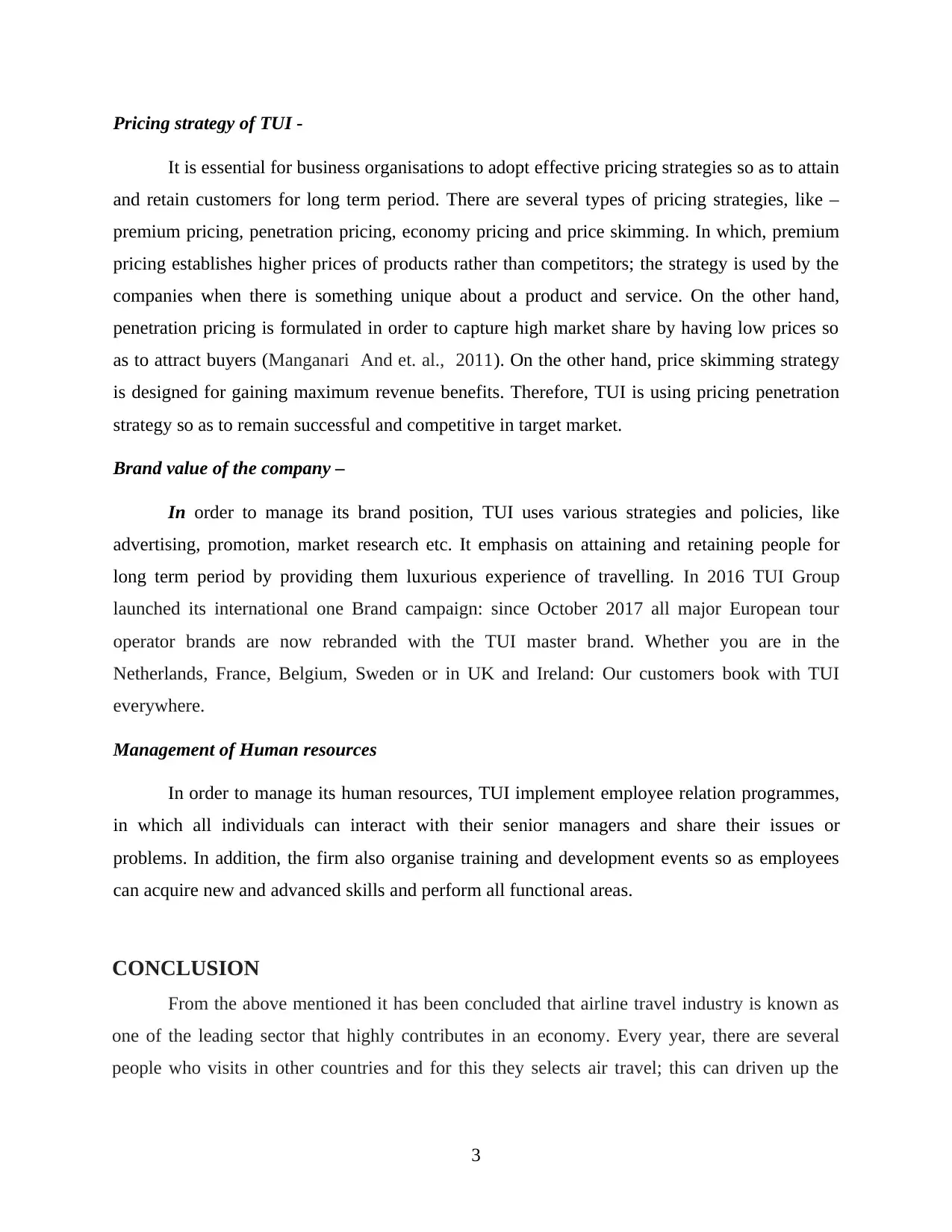
Pricing strategy of TUI -
It is essential for business organisations to adopt effective pricing strategies so as to attain
and retain customers for long term period. There are several types of pricing strategies, like –
premium pricing, penetration pricing, economy pricing and price skimming. In which, premium
pricing establishes higher prices of products rather than competitors; the strategy is used by the
companies when there is something unique about a product and service. On the other hand,
penetration pricing is formulated in order to capture high market share by having low prices so
as to attract buyers (Manganari And et. al., 2011). On the other hand, price skimming strategy
is designed for gaining maximum revenue benefits. Therefore, TUI is using pricing penetration
strategy so as to remain successful and competitive in target market.
Brand value of the company –
In order to manage its brand position, TUI uses various strategies and policies, like
advertising, promotion, market research etc. It emphasis on attaining and retaining people for
long term period by providing them luxurious experience of travelling. In 2016 TUI Group
launched its international one Brand campaign: since October 2017 all major European tour
operator brands are now rebranded with the TUI master brand. Whether you are in the
Netherlands, France, Belgium, Sweden or in UK and Ireland: Our customers book with TUI
everywhere.
Management of Human resources
In order to manage its human resources, TUI implement employee relation programmes,
in which all individuals can interact with their senior managers and share their issues or
problems. In addition, the firm also organise training and development events so as employees
can acquire new and advanced skills and perform all functional areas.
CONCLUSION
From the above mentioned it has been concluded that airline travel industry is known as
one of the leading sector that highly contributes in an economy. Every year, there are several
people who visits in other countries and for this they selects air travel; this can driven up the
3
It is essential for business organisations to adopt effective pricing strategies so as to attain
and retain customers for long term period. There are several types of pricing strategies, like –
premium pricing, penetration pricing, economy pricing and price skimming. In which, premium
pricing establishes higher prices of products rather than competitors; the strategy is used by the
companies when there is something unique about a product and service. On the other hand,
penetration pricing is formulated in order to capture high market share by having low prices so
as to attract buyers (Manganari And et. al., 2011). On the other hand, price skimming strategy
is designed for gaining maximum revenue benefits. Therefore, TUI is using pricing penetration
strategy so as to remain successful and competitive in target market.
Brand value of the company –
In order to manage its brand position, TUI uses various strategies and policies, like
advertising, promotion, market research etc. It emphasis on attaining and retaining people for
long term period by providing them luxurious experience of travelling. In 2016 TUI Group
launched its international one Brand campaign: since October 2017 all major European tour
operator brands are now rebranded with the TUI master brand. Whether you are in the
Netherlands, France, Belgium, Sweden or in UK and Ireland: Our customers book with TUI
everywhere.
Management of Human resources
In order to manage its human resources, TUI implement employee relation programmes,
in which all individuals can interact with their senior managers and share their issues or
problems. In addition, the firm also organise training and development events so as employees
can acquire new and advanced skills and perform all functional areas.
CONCLUSION
From the above mentioned it has been concluded that airline travel industry is known as
one of the leading sector that highly contributes in an economy. Every year, there are several
people who visits in other countries and for this they selects air travel; this can driven up the
3
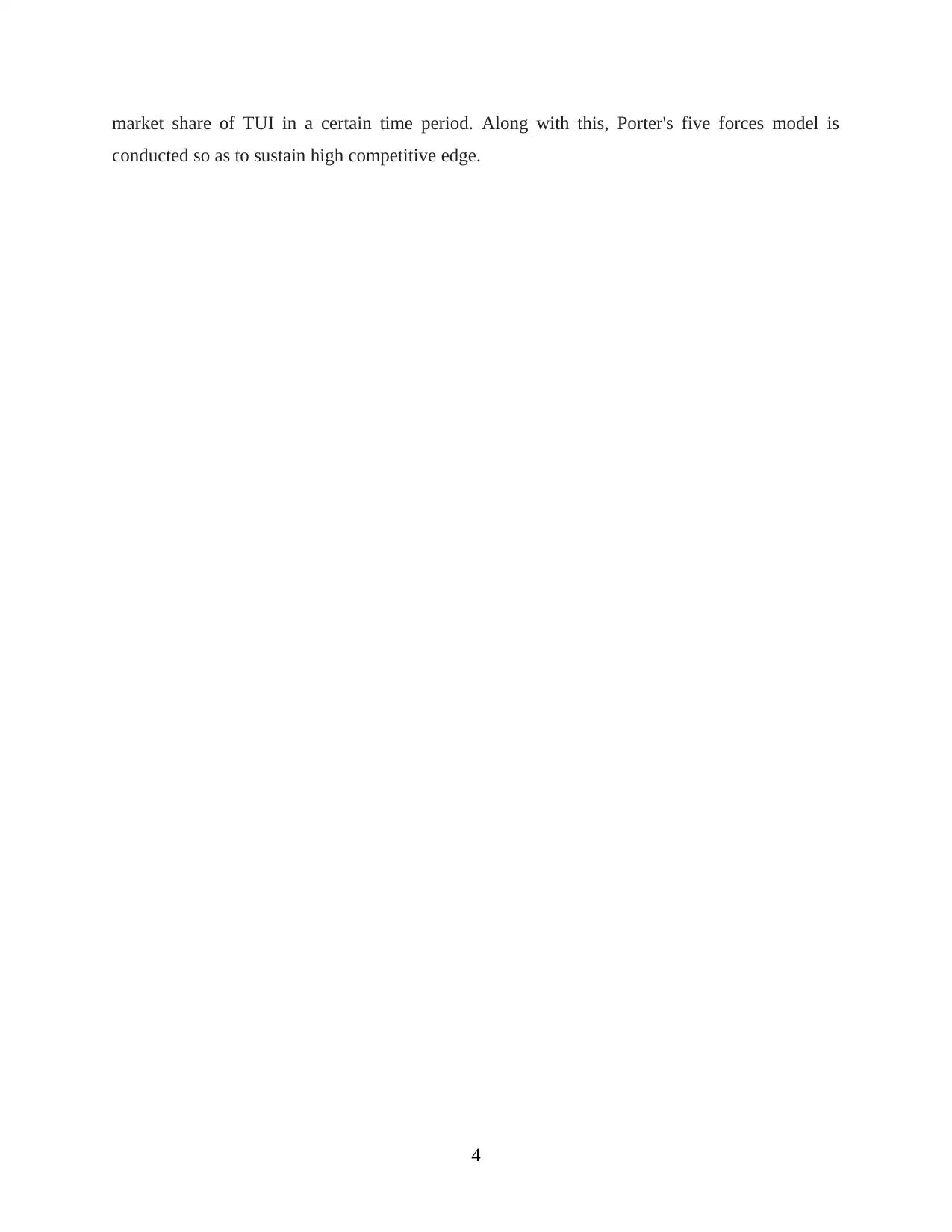
market share of TUI in a certain time period. Along with this, Porter's five forces model is
conducted so as to sustain high competitive edge.
4
conducted so as to sustain high competitive edge.
4
⊘ This is a preview!⊘
Do you want full access?
Subscribe today to unlock all pages.

Trusted by 1+ million students worldwide
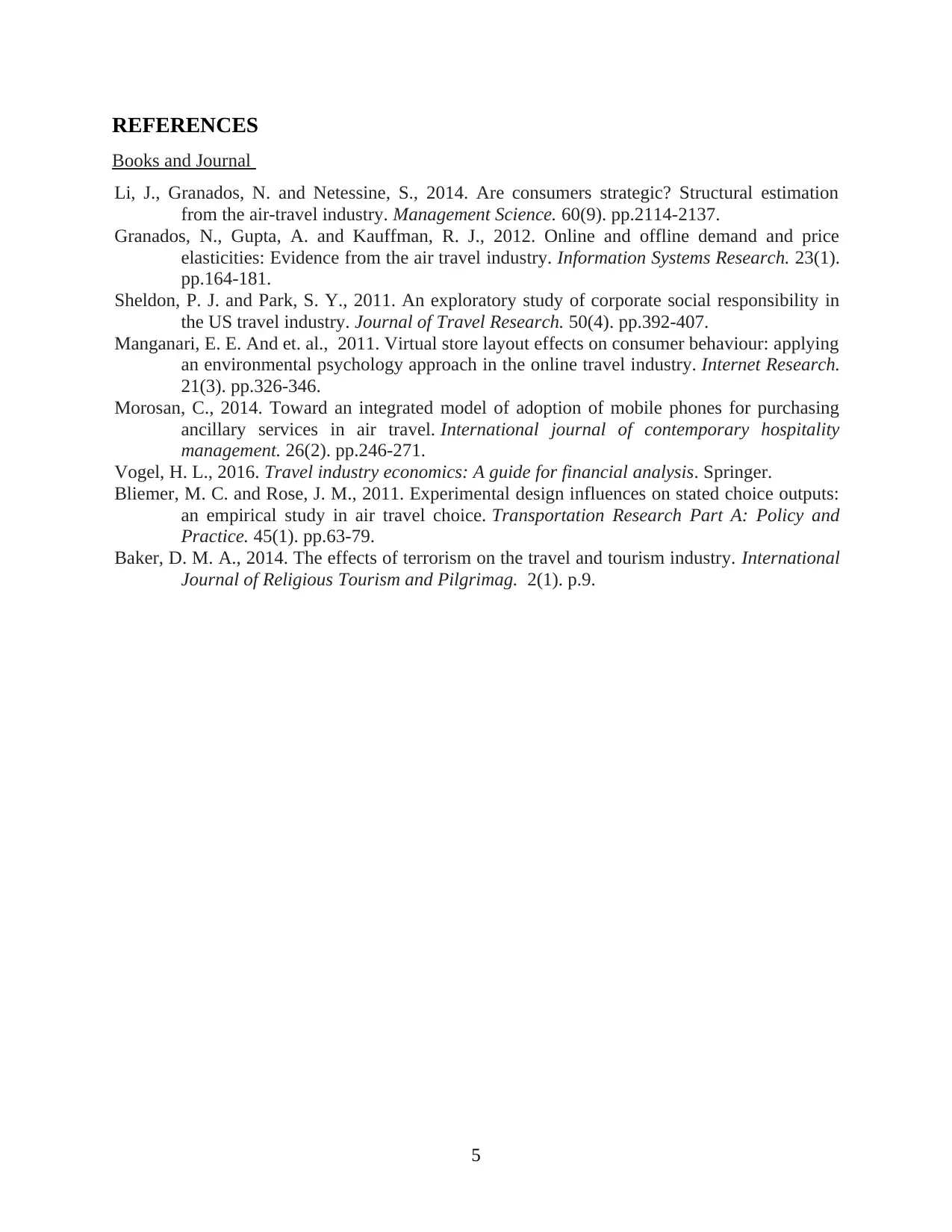
REFERENCES
Books and Journal
Li, J., Granados, N. and Netessine, S., 2014. Are consumers strategic? Structural estimation
from the air-travel industry. Management Science. 60(9). pp.2114-2137.
Granados, N., Gupta, A. and Kauffman, R. J., 2012. Online and offline demand and price
elasticities: Evidence from the air travel industry. Information Systems Research. 23(1).
pp.164-181.
Sheldon, P. J. and Park, S. Y., 2011. An exploratory study of corporate social responsibility in
the US travel industry. Journal of Travel Research. 50(4). pp.392-407.
Manganari, E. E. And et. al., 2011. Virtual store layout effects on consumer behaviour: applying
an environmental psychology approach in the online travel industry. Internet Research.
21(3). pp.326-346.
Morosan, C., 2014. Toward an integrated model of adoption of mobile phones for purchasing
ancillary services in air travel. International journal of contemporary hospitality
management. 26(2). pp.246-271.
Vogel, H. L., 2016. Travel industry economics: A guide for financial analysis. Springer.
Bliemer, M. C. and Rose, J. M., 2011. Experimental design influences on stated choice outputs:
an empirical study in air travel choice. Transportation Research Part A: Policy and
Practice. 45(1). pp.63-79.
Baker, D. M. A., 2014. The effects of terrorism on the travel and tourism industry. International
Journal of Religious Tourism and Pilgrimag. 2(1). p.9.
5
Books and Journal
Li, J., Granados, N. and Netessine, S., 2014. Are consumers strategic? Structural estimation
from the air-travel industry. Management Science. 60(9). pp.2114-2137.
Granados, N., Gupta, A. and Kauffman, R. J., 2012. Online and offline demand and price
elasticities: Evidence from the air travel industry. Information Systems Research. 23(1).
pp.164-181.
Sheldon, P. J. and Park, S. Y., 2011. An exploratory study of corporate social responsibility in
the US travel industry. Journal of Travel Research. 50(4). pp.392-407.
Manganari, E. E. And et. al., 2011. Virtual store layout effects on consumer behaviour: applying
an environmental psychology approach in the online travel industry. Internet Research.
21(3). pp.326-346.
Morosan, C., 2014. Toward an integrated model of adoption of mobile phones for purchasing
ancillary services in air travel. International journal of contemporary hospitality
management. 26(2). pp.246-271.
Vogel, H. L., 2016. Travel industry economics: A guide for financial analysis. Springer.
Bliemer, M. C. and Rose, J. M., 2011. Experimental design influences on stated choice outputs:
an empirical study in air travel choice. Transportation Research Part A: Policy and
Practice. 45(1). pp.63-79.
Baker, D. M. A., 2014. The effects of terrorism on the travel and tourism industry. International
Journal of Religious Tourism and Pilgrimag. 2(1). p.9.
5
1 out of 7
Related Documents
Your All-in-One AI-Powered Toolkit for Academic Success.
+13062052269
info@desklib.com
Available 24*7 on WhatsApp / Email
![[object Object]](/_next/static/media/star-bottom.7253800d.svg)
Unlock your academic potential
Copyright © 2020–2026 A2Z Services. All Rights Reserved. Developed and managed by ZUCOL.





